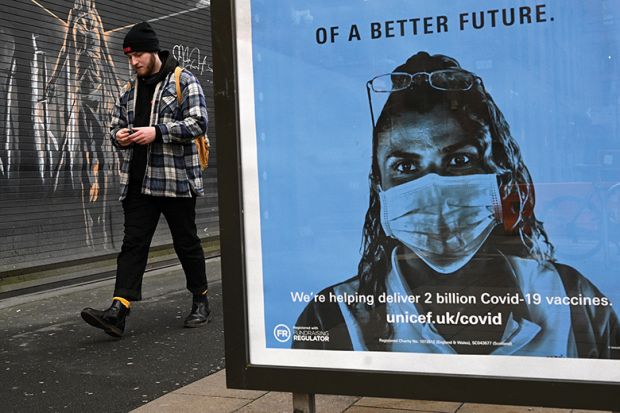Universities have been urged to carefully consider the rationale for demanding that students are vaccinated against Covid-19 before they can return to campus, as the idea gathers momentum across the world.
More than a dozen leading US institutions have announced that students will have to be immunised to enrol this autumn, including Boston, Brown, Cornell and Duke universities. Other campuses introducing the mandate – which in some cases extends to staff – include Northeastern University, Rutgers, the State University of New Jersey, and the University of Notre Dame.
In Israel, which has one of the highest vaccination rates in the world, students must have a Covid “green pass” to attend most in-person classes. This requires them to be fully inoculated or to have recently recovered from coronavirus.
Christopher Marsicano, assistant professor of the practice of higher education at Davidson College and founding director of the College Crisis Initiative, a research project tracking the response of higher education to the pandemic, said it was “only a matter of time before other institutions make the same decision”, noting that many US universities already required students to be vaccinated against other diseases under institutional or state policies.
A recent survey of more than 1,000 university students in the UK, commissioned by the University of East London, found that the majority agreed that they should only be able to return to in-person teaching and shared accommodation once they had been vaccinated.
Eyal Zisser, vice-rector of Tel Aviv University, said that mandating vaccination was “the practical thing to do” to “revive campus life”. But he stressed that the policy would not have been implemented without support from students, who can still join many classes remotely if they wish. The green pass rule cannot be applied to employees under Israeli law, so academics and other staff are exempt.
“By implementing this method, you put pressure on students to get a vaccine,” Professor Zisser said. “But we don’t force anyone to come back.”
Elsewhere, the Chinese government has announced that it will only process visas for travellers who have received a Chinese-made Covid vaccine. This has caused alarm among international students stranded outside the country, particularly those in nations where the Chinese vaccine is not available. The World Health Organisation has yet to approve a Chinese Covid vaccine.
Mark Woolhouse, professor of infectious disease epidemiology at the University of Edinburgh, said a vaccine passport scheme for campuses “needs careful consideration” and “it depends on what you want the vaccine to achieve”, particularly given that students were at low risk of getting seriously ill from Covid-19.
He said there was early evidence that vaccination reduced transmission rates, “but we haven’t yet got a very accurate estimate of how well it does that and so how effective it would be in stopping the infection actually spreading at a university, which could be a separate thing from stopping it causing disease at a university”. If vaccines were effective at stopping transmission, then passport schemes may help prevent the surges of infection on campuses that were seen at the beginning of the 2020-21 academic year, he added.
Professor Woolhouse said another aspect to consider was the uptake of the vaccine among students once they are offered the jab.
“If [vaccination rates] are as high as they have been in the vulnerable groups that have been vaccinated so far, a university would have to ask: what is the added value of a vaccine passport? Are we just trying to persuade the very last few to get vaccinated or are we going to leave them to choose not to be? If we do need to encourage uptake to be higher, is a vaccination passport the way to go or should we just have an information campaign?” he said.
“Any university looking to put vaccine passports in place would need to be very clear in their own strategic thinking why they were doing it and what threat they were mitigating by doing it.”
However, Dr Marsicano said that once Covid vaccines received full approval from the US Food and Drug Administration – they are currently approved only for emergency use – and vaccine eligibility opened up to all, “more and more” US universities will begin to announce vaccine requirements.
“By fall 2022, if not fall 2021, I expect a majority of colleges and universities to require proof of vaccination against Covid-19,” he said.
“Moreover, universities should require the vaccine…Those institutions that require vaccination will be able to get as close to pre-pandemic conditions as possible – and students will flock to them in droves.”
POSTSCRIPT:
Print headline: Vaccine passport roll-out met with caution
Register to continue
Why register?
- Registration is free and only takes a moment
- Once registered, you can read 3 articles a month
- Sign up for our newsletter
Subscribe
Or subscribe for unlimited access to:
- Unlimited access to news, views, insights & reviews
- Digital editions
- Digital access to THE’s university and college rankings analysis
Already registered or a current subscriber? Login







